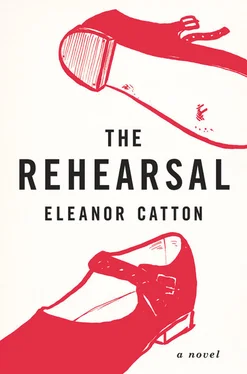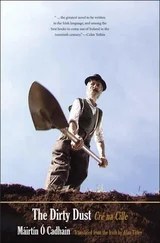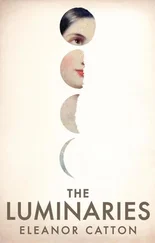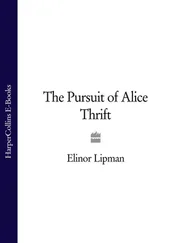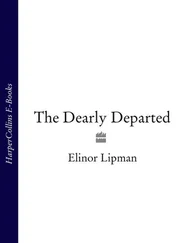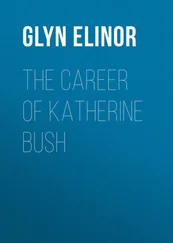She stands up to pace.
“I know you wanted your daughter to find out about it all the ordinary way. You wanted her to find out behind the bike sheds, or underneath the bleachers on the rugby field, or in Social Studies, the facts written on the whiteboard with a felt-tipped pen. You wanted her to sneak glances at magazines and at movies she wasn’t allowed to see. You wanted her to start off with some sort of blind sticky grope in her mate’s front room on a Saturday night while her friends are outside being sick into flowerpots. That might happen more than once. It might become a phase. But you’d be prepared for it.”
As Mrs. Tyke watches the saxophone teacher she lets something steal across her face, not something as crude and bold as realization or awakening, but something which registers only as a slackening of her features, a tiny release. It’s such a good performance the saxophone teacher almost forgets she’s acting.
“You wanted her to finally get a boyfriend in sixth form maybe, some prancing, empty sort of boy you didn’t really like, and you wanted to catch her with him eventually, coming home early because you had a funny feeling, and seeing them on the couch, or on the floor, or in her bedroom among her teddy bears and her frilly pink cushions that she doesn’t really like but she’ll never throw away.
“I respect these things that you wanted for your daughter,” the saxophone teacher says. “I imagine they must be the things that every good mother wants. It’s a terrible thing that this venomous little man should have stolen your daughter’s innocence so slyly, without ever having laid a finger on her, shoving his dirty little secrets down her throat like candy from a brown paper bag.
“But what you need to understand, my darling,” she whispers, “is that this little taste your daughter has had is a taste of what could be. She’s swallowed it. It’s inside her now.”
February
“The first term,” they said, “is essentially a physical and emotional undoing. You will unlearn everything you have ever learned, peeling it off skin by skin, stripping down and down until your impulse shines through.”
“This Institute,” they said, “cannot teach you how to be an actor. We cannot give you a map or a recipe or an alphabet that will teach you how to act or how to feel. What we do at this Institute is not teaching by accumulation, collecting skills as one might collect a marble or a token or a charm. Here at this Institute we teach by elimination. We help you learn to eliminate yourself.”
“You may break or be broken,” they said. “This happens.”
The fat one on the end leaned forward and said, with emphasis, “A good actor makes a gift of himself.”
“An actor is someone who offers up his body publicly,” they said. “This can happen in one of two ways. The actor can exploit himself, treat his body as a ready and obedient instrument, a product to be sold. At this Institute we do not favor this approach. We do not breed confectioners or clowns. You are not here to sell your body: you are here to sacrifice it.”
And then they said, “You’re not at high school anymore.”
February
“I graduated from the Institute in December,” said the golden boy, his gaze passing from face to face with calm disinterest. “They asked me to come and talk to you guys today about my experience of the program and where I’m headed now and maybe you can ask some questions if you have any.”
He sat cross-legged on the gymnasium floor like a prophet.
“God, I envy you guys,” he said, and then he smiled and smiled. “Not too virginal, not too defiled. Sitting there all shiny and pregnant with the best still yet to come.”
The golden boy looked at them, the tight pale ring of nervous faces and black tee-shirts still creased down the middle with newness.
“The three years I spent at this Institute didn’t just shape me as an artist. They shaped me as a person,” he said. “This place woke me up.”
He flushed brightly as if he were describing a lover he had lost.
“Everything you’ve ever slammed shut gets reopened here,” he said. “If none of you had auditioned and been accepted you would all have become cemented, cast in plaster and molded for the rest of your adult life. That’s what’s happening to everybody else, out there. In here you never congeal. You never set or crust over. Every possibility is kept open—it must be kept open. You learn to hold all these possibilities in your fist and never let any of them go.”
There was a silence. The golden boy smoothed the knees of his corduroy pants and said, as if he had just thought of it, “Remember that anybody who is clever enough to set you free is always clever enough to enslave you.”
October
Stanley was disappointed with his life so far. Here, on the eve of his eighteenth birthday, he stood in the rich dusty quiet of the shuttered foyer in a paralysis of bitterness and dissatisfaction. He was thinking about everything he was not.
Stanley had expected to be savage and dissenting and righteous as a teenager—he had yearned for it, even—and grew more and more dissatisfied as his high-school years passed politely by. He had expected to drink whisky from a paper-bagged bottle by the river, and slip his cold hands up a girl’s skirt in the patch of scrub beyond the tennis courts, and take shots at passing cars with a potato-gun from a neighbor’s garage roof. He had expected to drink himself blind and vandalize the bus shelters in the suburbs, to drive without a license, to retreat from his family, to turn sour, and to frighten his mother, maybe, by refusing to eat or leave his room. This was his entitlement, his rightful lot, and instead he had spent his high-school years playing gentlemanly sport and watching family television, admiring from a distance the boys brave enough to fight each other, and longing for every girl he passed to lift her head and look him in the eye.
Stanley heard the voice of the Institute tutors in his mind. “The real thrill of the stage,” they said, “is the thrill of knowing that at any moment something might go wrong. At any moment something on the stage might break or fall over; someone might miss their cue, someone might botch the lighting, someone might forget their accent or their lines. You are never fearful watching a film, because what you are watching is always complete, always the same and always perfect; but you are often fearful watching a play, in case something goes foul and you must then suffer the private embarrassment of watching the actors flounder and repair themselves. But at the same time, in the silky dark of the auditorium, you ache for something to go wrong. You desire it utterly. You feel tender toward any actor whose hat falls off, whose button breaks. You gasp and applaud when an actor trips and rights himself. And if you see a mistake that others in the audience miss, then you feel a special privilege, as if you are glimpsing a seam of a secret undergarment, something infinitely private, like a scarlet bite-mark on the inside of a woman’s thigh.”
Stanley stood in the foyer of the Institute and looked about him. Here was another possible life that was in his power to claim, another life he wanted, just as he had wanted, as a shy and useless teenager, to be unfeeling and disrespectful and casual and vile. Now, as then, he felt the weight of a terrible inertia pin him to the foyer floor. He suffered all over again the disappointing and quotable truth that the world would not come to him, or wait for him, or even pause: if he waited, this life would simply pass him by. Stanley thought about this and felt deflated and terribly short-changed.
Читать дальше
